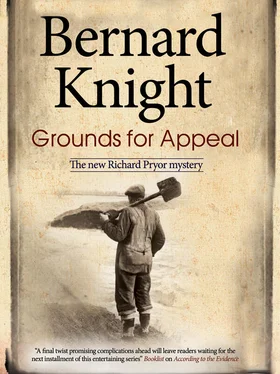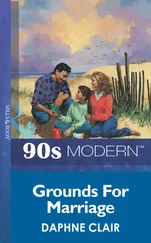Bernard Knight - Grounds for Appeal
Здесь есть возможность читать онлайн «Bernard Knight - Grounds for Appeal» весь текст электронной книги совершенно бесплатно (целиком полную версию без сокращений). В некоторых случаях можно слушать аудио, скачать через торрент в формате fb2 и присутствует краткое содержание. Жанр: Классический детектив, на английском языке. Описание произведения, (предисловие) а так же отзывы посетителей доступны на портале библиотеки ЛибКат.
- Название:Grounds for Appeal
- Автор:
- Жанр:
- Год:неизвестен
- ISBN:нет данных
- Рейтинг книги:4 / 5. Голосов: 1
-
Избранное:Добавить в избранное
- Отзывы:
-
Ваша оценка:
- 80
- 1
- 2
- 3
- 4
- 5
Grounds for Appeal: краткое содержание, описание и аннотация
Предлагаем к чтению аннотацию, описание, краткое содержание или предисловие (зависит от того, что написал сам автор книги «Grounds for Appeal»). Если вы не нашли необходимую информацию о книге — напишите в комментариях, мы постараемся отыскать её.
Grounds for Appeal — читать онлайн бесплатно полную книгу (весь текст) целиком
Ниже представлен текст книги, разбитый по страницам. Система сохранения места последней прочитанной страницы, позволяет с удобством читать онлайн бесплатно книгу «Grounds for Appeal», без необходимости каждый раз заново искать на чём Вы остановились. Поставьте закладку, и сможете в любой момент перейти на страницу, на которой закончили чтение.
Интервал:
Закладка:
Priscilla had spent most of the war years in a boarding school in Gloucestershire, then in 1944 went to university on a scholarship. Some mental arithmetic told him that she must be just over thirty years of age, a decade younger than himself.
For her part, the drive gave Priscilla the chance to fill in the gaps in her knowledge of Richard. From laboratory gossip, she knew some of the facts, but by the time they reached Cardiganshire, she knew that he was the son of a retired family doctor in Merthyr Tydfil, where he had been brought up. Grammar school was followed by medical college in Cardiff before the war, then a couple of years’ pathology training before being called up. He spent the war as an RAMC officer in military hospitals in Egypt and Ceylon before being finally posted to Singapore, when it was reclaimed from the Japanese. Taking local release with the rank of major there in 1946, he stayed on as a civilian pathologist in the General Hospital, doing coroner’s and police work. This came with a part-time teaching post in the university and he ended his nine-year’s service with a professorship in forensic medicine. A very generous redundancy payment had coincided with his aunt’s bequest of Garth House and he had returned at the beginning of the year to set up his private forensic consultant practice with Angela. They had hatched his idea after meeting at a forensic congress the previous year. Angela was disillusioned with her job at the Metropolitan Police Laboratory, where there was little prospect of further promotion, so she threw in her lot with Richard and moved to the Wye Valley. That was six months ago and after a hesitant start, they were now becoming well established, gathering work from coroners, solicitors and the police, as well as Richard’s part-time contract as a lecturer at the medical school in Bristol.
The roads were quiet and the journey passed pleasantly, Priscilla being enthralled by the lovely countryside and then the lonely hills beyond Rhyader. Like Angela, she was a Thames Valley girl and the Cambrian mountains were a surprise to her.
They rolled into Aberystwyth before eleven o’clock and found the police station on the elegant promenade, housed in a large granite building which used to be the Queen’s Hotel. The detective inspector met them and took them to his tiny office in the Victorian building, where they were obliged to have a cup of police tea, almost strong enough to hold a spoon upright.
‘My sergeant and few uniformed officers have gone up there already,’ he explained. ‘We’ve also asked a lady from the archaeology department of the college to attend, as she seemed very keen to be there.’
As they went down to the cars in the back yard, Priscilla thought that local archaeologists would be over the moon if an Iron Age bog body was found on their patch, but Richard still maintained that whatever it was, the presence of adipocere was probably too recent for that. They followed the police car in the Humber and, half an hour later, pulled up behind two vans and a pre-war Hillman Minx parked on the road between Llancynfelyn and Ynys Las, the nearest point to where a group of distant figures were congregated on the bog.
Taking Meirion Thomas’s advice, the two from Tintern took their rubber boots from the back of the car and pulled them on, then followed him across the fields. Richard carried his square black ‘murder bag’ with his instruments, while Priscilla had a bag with a camera and specimen jars.
Gwyn Parry, the detective sergeant, introduced himself and Doctor Eva Boross, the archaeologist. She was a cheerful, rotund woman of about sixty, with wild grey hair and fingers stained brown from a lifetime of heavy smoking. Wearing a plaid lumberjacket and a pair of riding breeches, she was quite unlike Richard’s mental image of a Hungarian, but her accent was still strong after twenty years in Britain. With their similar professional backgrounds, Priscilla took to her immediately.
‘We started digging already,’ announced Eva. ‘The core sample was obtained from three feet down, so with care, nothing will be lost until we get near that depth.’
The posts and ropes had been moved further out and Doctor Boross had marked out a ten-foot square with pegs and white tape, centred on the borehole. Inside this, a couple of brawny policemen had dug out a deep hole four feet across. A portable pump, borrowed from the Fire Service, was chugging away nearby, discharging coffee-brown water from the hole into a pond fifty yards away. The diggers were putting the black peat into wheelbarrows, which another two constables were wheeling away to be placed carefully on a large tarpaulin laid well outside the working area.
‘That’s in case we need to go back to it and look through it in detail,’ Eva Boross explained. ‘Though trying to sieve this wet, fibrous stuff would be a nightmare!’
She retired to a safe distance to light a cigarette and meticulously dropped her ash back into the packet, though Richard thought this was a little overcautious. Even if the remains below were not all that ancient, he doubted whether a little fag ash on the surface would hinder any investigation.
‘How far down have they got?’ asked Richard, moving nearer the edge of the hole to take a look.
‘Most of the way, but keeping the bottom in sight is the problem, with the water oozing in all the time,’ said Gwyn Parry.
Shovelling more carefully now, the constables went down another six inches, then came up for a breather. Plastered up to their knees in black peat, they had a rest, then took over the wheelbarrows, while the other pair went down the hole.
For almost another hour, Priscilla and Richard waited patiently as relays of constables slid into the excavation, eventually using bricklayer’s trowels rather than spades. The lady from the university used a long measuring stick at intervals, to check the distance from the surface to the bottom of the pit.
‘Must be very near now,’ she muttered. ‘Those botany people were quite clear about the depth of their borehole.’
She had hardly spoken before one digger, almost doubled up in the hole, gave a muffled shout.
‘I can feel something here! It’s hard, like a stone.’ His pal decided to clamber up to the surface, to give the other man more room. Everyone came nearer, craning their heads to see down the pit, but the policeman’s large body and the muddy water defeated them.
‘Be careful the pump doesn’t suck anything out except water,’ cautioned Richard, imagining vital trace evidence vanishing down the pipe.
‘Easier said than done, sir! But I’ll dig a sump well away to one side and put the nozzle in that.’
A few moments later, he reported that the suction was gaining on the seeping water table and that when he momentarily swept the water away with his hand, he could see a blackened mound alongside a hard whitish thing.
Doctor Boross looked at Richard.
‘I think one of us should take over the digging now, doctor. Perhaps you should have a look first, to see what you can make of it?’
Thankfully, the constable climbed out of the excavation and Richard took his place. He wore a pair of old army jungle-green trousers inside his wellingtons and an even older leather jacket that he had had since his student days.
Immediately he was up to his ankles in water, but the powerful pump was more than holding its own, so that the level was slowly dropping back to the deep hole that the constable had dug in one corner. He could see a bulge in the bottom mud and pulled on a pair of thick rubber gloves that he had in his jacket pocket.
Feeling the lump, his fingers slid over a rounded mass and then, beneath the remaining water, encountered a hard structure, as unyielding as iron. Returning to the mound, he pressed into it and felt a slight indentation form under his fingers. More exploring under the surface gave him some idea of what was lurking beneath.
Читать дальшеИнтервал:
Закладка:
Похожие книги на «Grounds for Appeal»
Представляем Вашему вниманию похожие книги на «Grounds for Appeal» списком для выбора. Мы отобрали схожую по названию и смыслу литературу в надежде предоставить читателям больше вариантов отыскать новые, интересные, ещё непрочитанные произведения.
Обсуждение, отзывы о книге «Grounds for Appeal» и просто собственные мнения читателей. Оставьте ваши комментарии, напишите, что Вы думаете о произведении, его смысле или главных героях. Укажите что конкретно понравилось, а что нет, и почему Вы так считаете.












